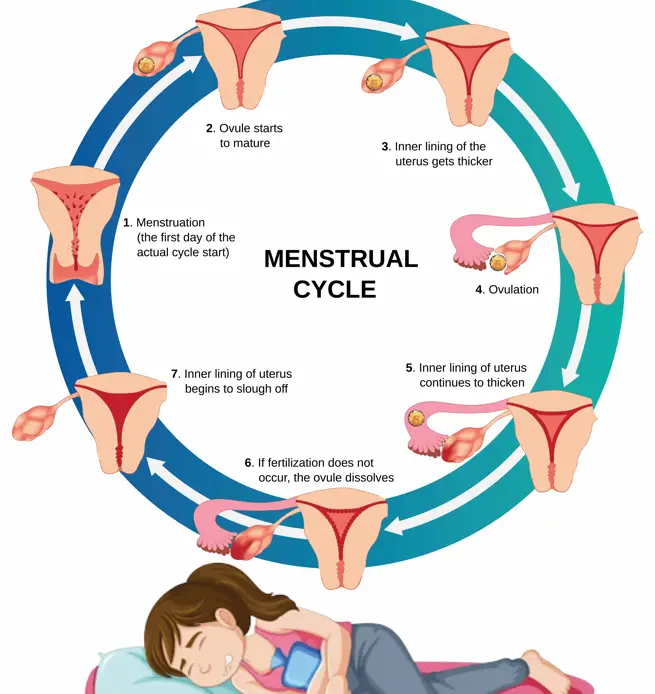Understanding Menstruation
Menstruation is a natural biological process that occurs in females typically between puberty and menopause. It involves the monthly shedding of the uterine lining, accompanied by hormonal changes orchestrated by the menstrual cycle.
Hormonal Dynamics
Throughout the menstrual cycle, estrogen and progesterone levels fluctuate, influencing various bodily functions beyond reproduction. These hormones not only regulate the menstrual cycle but also impact mood, energy levels, and metabolism. Understanding these hormonal dynamics can help individuals anticipate and manage changes in their physical and emotional well-being throughout the month.
Normal Variations and Health Considerations
While variations in menstrual cycles are normal, such as cycle length or menstrual flow, significant deviations may indicate underlying health issues. Conditions like polycystic ovary syndrome (PCOS), endometriosis, or thyroid disorders can affect menstrual regularity and overall health. It’s essential for individuals to track their menstrual cycles and consult healthcare providers if they notice persistent irregularities or concerning symptoms.
Key Elements of Menstrual Health

1. Nutrition and Diet
A balanced diet plays a crucial role in supporting menstrual health. Consuming nutrient-rich foods such as leafy greens, whole grains, lean proteins, and fruits can help regulate hormone levels and minimize menstrual discomfort. Incorporating foods rich in iron, calcium, and vitamins B and D can also contribute to overall well-being during menstruation.
2. Exercise and Physical Activity
Regular physical activity has been shown to alleviate menstrual symptoms such as cramps and mood swings. Engaging in moderate exercise like walking, swimming, or yoga can improve blood circulation and release endorphins, which are natural mood enhancers.
3. Hydration
Staying hydrated is essential for maintaining optimal menstrual health. Drinking plenty of water helps flush out toxins from the body and can reduce bloating and water retention commonly associated with menstruation.
4. Sleep and Rest
Adequate sleep and rest are crucial for hormonal balance and overall health during menstruation. Lack of sleep can exacerbate symptoms such as fatigue, mood swings, and cramps. Aim for 7-9 hours of quality sleep per night to support your body’s natural rhythms.
5. Stress Management
Chronic stress can disrupt the menstrual cycle and exacerbate symptoms like irregular periods or intensified cramps. Incorporate stress-reducing activities such as yoga, meditation, journaling, or spending time in nature to promote relaxation and hormonal balance.
6. Hormonal Balance
Hormones such as estrogen, progesterone, and testosterone play key roles in the menstrual cycle. Maintaining hormonal balance through healthy lifestyle choices, adequate nutrition, and regular exercise can help regulate menstrual cycles and minimize symptoms.
7. Avoiding Harmful Substances
Limiting or avoiding alcohol and caffeine during menstruation can help reduce symptoms like bloating and irritability. These substances can disrupt hormone levels and exacerbate menstrual discomfort in some individuals.
8. Regular Health Check-ups
Regular visits to your healthcare provider are essential for monitoring menstrual health and addressing any concerns or abnormalities promptly. Routine gynaecological exams and screenings can detect menstrual disorders or underlying health issues early, ensuring timely intervention and treatment.
9. Education and Awareness
Empowering yourself with knowledge about menstrual health and your body’s natural cycles can help you better understand and manage menstrual symptoms. Stay informed about menstrual disorders, treatment options, and advancements in menstrual health care.
Incorporating these additional key elements into your lifestyle can further support menstrual health and contribute to overall well-being. Taking a proactive approach to menstrual health ensures you can navigate your menstrual cycle with greater ease and comfort.
Managing Menstrual Symptoms

1. Pain Management
For many women, menstrual cramps can be debilitating. Over-the-counter pain relievers such as ibuprofen or naproxen sodium can help alleviate cramps. Heat therapy in the form of a heating pad or warm bath can also provide relief.
2. Emotional Well-being
Hormonal fluctuations during menstruation can impact mood and emotional well-being. Practicing stress management techniques such as deep breathing, meditation, or talking to a trusted friend or counselor can help manage emotional changes effectively.
Menstrual Hygiene
Maintaining proper menstrual hygiene is crucial for preventing infections and ensuring comfort during periods. Using high-quality menstrual products like organic cotton pads or tampons can minimize exposure to chemicals and reduce the risk of irritation.
Menstrual Disorders and When to Seek Help
While menstruation is generally a normal process, certain menstrual disorders such as irregular periods, heavy bleeding (menorrhagia), or severe pain (dysmenorrhea) may require medical attention. It’s important to consult a healthcare professional if you experience persistent or unusual menstrual symptoms.
Prioritizing menstrual health through nutrition, exercise, hydration, and proper hygiene practices can significantly enhance your overall well-being and quality of life. By incorporating these strategies into your lifestyle, you can manage menstrual symptoms effectively and promote long-term health.
Frequently Asked Questions
1. What is menstruation?
- Menstruation refers to the monthly shedding of the uterine lining (endometrium) in individuals assigned female at birth. It typically occurs in cycles from puberty until menopause.
2. How long does a menstrual cycle usually last?
- A menstrual cycle typically lasts about 28 days, but it can vary widely among individuals, ranging from 21 to 35 days.
3. What causes menstruation to occur?
- Menstruation occurs as a result of hormonal changes, specifically the rise and fall of estrogen and progesterone, which regulate the menstrual cycle.
Menstrual Symptoms and Management
4. What are common menstrual symptoms?
- Common menstrual symptoms include cramps (dysmenorrhea), bloating, fatigue, mood swings, breast tenderness, and headaches.
5. How can I manage menstrual cramps?
- Menstrual cramps can be managed with over-the-counter pain relievers (e.g., ibuprofen), heat therapy (e.g., heating pads), regular exercise, and relaxation techniques (e.g., yoga, meditation).
6. What are some natural remedies for menstrual discomfort?
- Natural remedies for menstrual discomfort include herbal teas (e.g., chamomile), dietary changes (e.g., consuming magnesium-rich foods), and acupuncture.
Menstrual Hygiene and Products
7. What menstrual hygiene products are available?
- Menstrual hygiene products include pads, tampons, menstrual cups, and period underwear. Each option varies in absorbency, comfort, and environmental impact.
8. How often should menstrual hygiene products be changed?
- Menstrual hygiene products should be changed every 4 to 8 hours to prevent bacterial growth and odor. However, this may vary depending on flow intensity.
Menstrual Disorders and Concerns
9. What are menstrual disorders?
- Menstrual disorders include conditions like irregular periods, heavy menstrual bleeding (menorrhagia), absent periods (amenorrhea), and painful periods (dysmenorrhea).
10. When should I see a healthcare provider about menstrual concerns? – You should consult a healthcare provider if you experience persistent irregularities in your menstrual cycle, severe menstrual pain, unusually heavy bleeding, or other concerning symptoms.
Menstrual Health and Lifestyle
11. How does diet affect menstrual health? – A balanced diet rich in nutrients like iron, calcium, and vitamins B and D can support menstrual health and help manage symptoms like fatigue and mood swings.
12. Does exercise affect menstrual cycles? – Regular exercise can help regulate menstrual cycles, reduce menstrual pain, and improve overall well-being. However, excessive exercise may disrupt the menstrual cycle.
References
Dietary Adjustments and Anti-inflammatory Foods:
- Chiu HY, et al. “Effects of Omega-3 Fatty Acids on Inflammatory Markers in PCSO-524®-treated Women with Dysmenorrhea: A Randomized Placebo-controlled Trial.” BioMed Research International, vol. 2016, 2016. Link to study.
Herbal Remedies:
- Rahnama P, et al. “Effect of Zingiber officinale R. rhizomes (ginger) on pain relief in primary dysmenorrhea: a placebo randomized trial.” BMC Complementary and Alternative Medicine, vol. 12, no. 1, 2012. Link to study.
Supplements:
- De Souza MC, et al. “Essential fatty acids for premenstrual syndrome and their effect on prolactin and total cholesterol levels: a randomized, double blind, placebo-controlled study.” Reproductive Health, vol. 5, 2008. Link to study.
Acupuncture and Acupressure:
- Armour M, et al. “Acupuncture for dysmenorrhoea.” Cochrane Database of Systematic Reviews, vol. 2016, no. 4, 2016. Link to study.
Heat Therapy:
- Proctor M, et al. “Nonsteroidal anti-inflammatory drugs for primary dysmenorrhoea.” Cochrane Database of Systematic Reviews, vol. 2017, no. 1, 2017. Link to study.
Cognitive Behavioral Techniques:
- Hocaoglu C, et al. “Effects of cognitive-behavioral therapy on anxiety and primary dysmenorrhea.” Journal of the American Academy of Nurse Practitioners, vol. 24, no. 4, 2012. Link to study.

